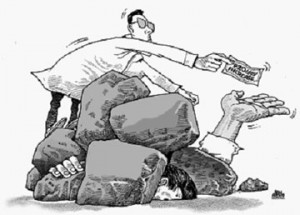
Even even the board’s labor representatives signed the decision despite their misgivings.
Michael Mendoza, area vice president of the Associated Labor Unions-Trade Union Congress of the Philippines (ALU-TUCP) Central Visayas chapter, said the amount was too small “but it was better than nothing.”
Regional Director Exequiel Sarcauga of the Department of Labor and Employment in Central Visayas trumpeted the P20 wage increase as “the biggest granted so far by the wage board,” which meant that it was three pesos more than last year’s increase in the minimum wage.
Whatever their argument, government and management representatives in the board got their wish and settled for a P20 wage hike but labor can’t be faulted for lack of trying.
Ernesto Carreon, ALU lawyer, first haggled for P50 increase and then made the final P25 gambit, both of which were rejected outright along with the ALU’s original petition of a P100 wage increase.
A construction laborer can’t grasp inflation statistics and Power point slides that dominated the deliberations of the wage board. What he knows is that even if his employer follows the law and pays him the minimum wage, even that can barely support his family if he’s the lone breadwinner.
To the wage board’s credit, it recognized that a wage adjustment was direly needed in the light of fuel price increases and inflation that make it difficult to make ends meet. These “supervening events” were cited to break the one-year restriction of the Labor Code against disturbing a previous wage order.
The relief just had to be given earlier.
A floor wage doesn’t benefit all employees, but has direct impact on those occupying entry line jobs. New hires, security guards, clerks, outsourced agency employees, factory workers, etc. have this as their only legal protection of being paid their due.
At P305 a day, Metro Cebu’s new rate is higher than most regions in the country, except for the National Capital Region (Metro Manila), where the floor wage is P426 a day.
While labor groups groan that the adjustment is too meager, businesses, like the exporters, are hurting. Exporters asked for a six-month reprieve amid weaker markets abroad owing to the global market recession.
One way employers can lighten the load is to explore alternative benefits for workers like medical coverage and productivity bonuses as non-cash benefits.
Labor-management relations need not end in acrimonious debate. Both parties comprise a symbiotic whole that sustains this country’s economy.